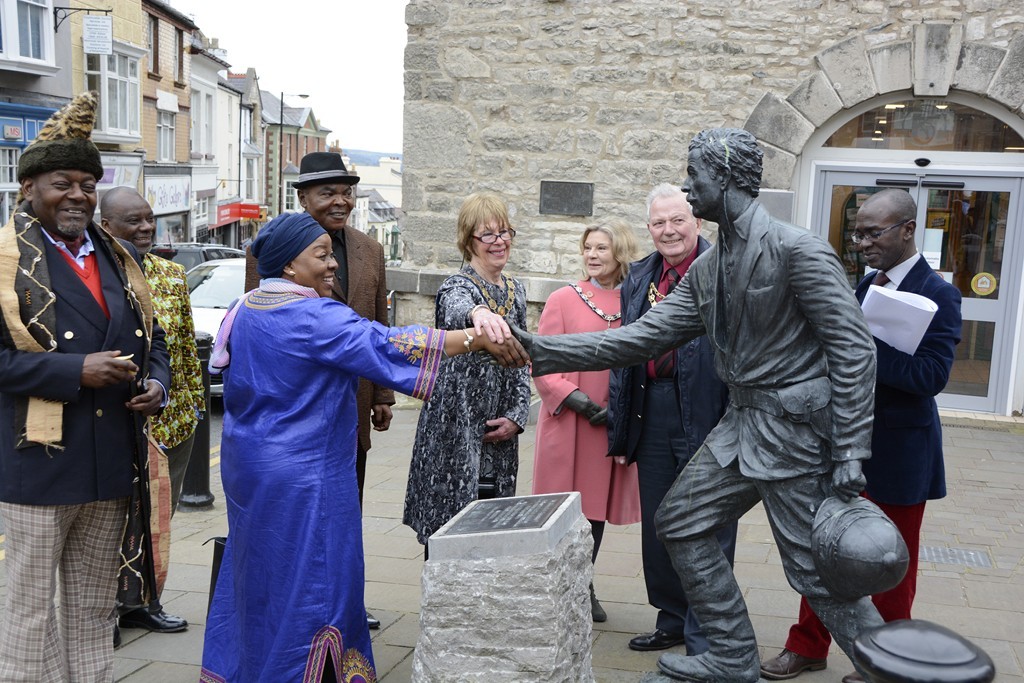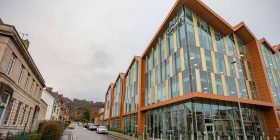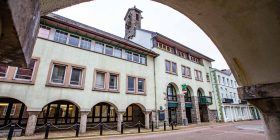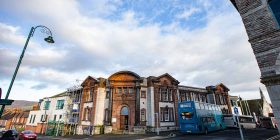Councillor insists explorer commemorated on Denbigh statue is ‘not racist’

A county councillor responsible for the installation of a statue commemorating HM Stanley has rejected claims the adventurer was racist.
Denbighshire councillor Gwyneth Kensler said she would never have supported installation of the statue in Denbigh had Stanley been so.
She spoke to the Local Democracy Reporting Service after listening to “so many inaccuracies” she feels “need to be addressed”.
The furore over the controversial St Asaph-born figure’s bronze likeness in Denbigh was re-ignited after worldwide Black Lives Matter protests against institutional racism.
They followed the death of George Floyd under the knee of Minneapolis police officer Derek Chauvin in May.
A DR Congo delegation to Denbigh, led by Chargee D’Affaires Madame Marie Louise Kafenge Nanga, praised the Welshman’s exploits in their country in 2016.
In her speech to Denbigh town’s council Mme Nanga said: “I do not have anything new to tell you except for what he means to the Democratic Republic of Congo.
“For us Congolese, when we read the history of our country, he isn’t Sir Henry Morton Stanley, and even less so, John Rowlands.
“For us he is ‘Bula Matadi’ which means ‘Breaker of Rocks’.
“He is the very man who had the extraordinary skill of being able to outline the present borders of the Democratic Republic of Congo.”
Stanley founded the capital Kinshasa and the country’s third largest city Kingani (formerly Stanleyville).
Mme Nanga said schoolchildren in DR Congo learned how he opened up the country to the outside world and was instrumental in developing its railways.
She added: “We come to express our gratitude for all the work that he accomplished in the Democratic Republic of Congo and to invite you, his fellow citizens to be proud of his heritage.”
Mme Nanga suggested twinning Denbigh with Boma, where Stanley lived in a house he carved out of a baobab tree – still a popular tourist destination.
More than 50 prominent figures signed a public letter opposing the memorial to Stanley before it was unveiled in March 2011.
Its future will be debated at a specially convened meeting on Wednesday June 24 by Denbigh’s town council.
Removal of another obelisk that celebrates him in St Asaph will be discussed by its city council on the same date.
Cllr Kensler’s defence of journalist and explorer Stanley came after ex-Vale of Clwyd MP Chris Ruane said he was wrong to support the memorial and called for a public consultation on its removal.
Cllr Kensler added: “I have read so many inaccuracies in the current coverage of the removal of the Stanley statue outside Denbigh Library – these need to be addressed.
“It is so easy these days to put out ‘false facts’ and for these to gain acceptance.
“Stanley was not a racist; he was sacked by King Leopold II in 1884 because he would not accept Leopold’s instructions.
“Had Stanley been a racist I certainly would not have worked to establish a statue to him.
“I plead to everyone, get the facts, seek the truth and let us try to rid our country of racism.”
But Bishop of St Asaph Gregory Cameron has called for the removal of monuments celebrating Stanley.
He said: “He was an adventurer, who had little respect for the natives of Africa, and who shared in management of one of the most atrocious and exploitative colonial endeavours ever in that vast continent, the enslaving of an entire population to service the wealth creation of King Leopold II of the Belgians through the production of rubber.
“He repudiated his Welsh upbringing and paid scant regard to the communities of St Asaph and Denbigh which had nurtured him.
“So why exactly is there a statue of him in Denbigh’s main square, and another monument at the bottom of St Asaph’s High Street?”
St Asaph Cathedral contains a small plaque to Stanley and discussions are taking place as to whether it should be removed or a further panel added to provide interpretation.
Stanley was born John Rowlands in St Asaph and grew up in the Asaph Union Workhouse, on the site of what became HM Stanley Hospital.
He eventually became a teacher and emigrated to the USA, where he fought in the Civil War before becoming a journalist.
He then embarked on a career as an explorer and gained work for King Leopold II of Belgium in Congo Free State.
Sir Roger Casement chronicled alleged atrocities carried out against the Congolese in the name of the king and implicated Stanley.
It became the basis for a report by the Belgian Government which recommended wresting control of the region from the King, who clandestinely ran the country as a side venture.
However Cllr Kensler said Stanley, born in St Asaph, had been out of the country for about eight years by the time the atrocities started.
She added: “He loved Africans, was vehemently against the slave trade and wrote articles to that effect. He cannot be linked to the slave trade in any way.
“I urge everyone to read Tim Jeal’s biography of Stanley; he had access to primary sources. This is the first line of research.”
The Congoloses embassy in London has been contacted for comment.
By Jez Hemming – Local Democracy Reporter
Spotted something? Got a story? Send a Facebook Message | A direct message on Twitter | Email news@north.wales






